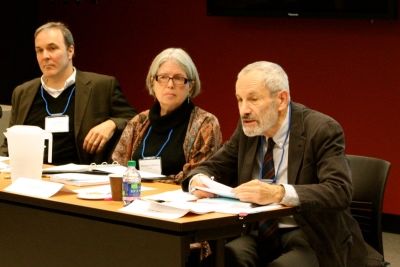
The Centre for Law in the Contemporary Workplace (CLCW) at Queen’s is tackling a Supreme Court of Canada decision that has spawned two decades of controversy about the role of labour arbitration in adjudicating workplace disputes involving unionized employees. On Oct. 30–31, the CLCW is presenting the “One Law for All:” Has Weber v. Ontario Hydro Transformed Collective Agreement Administration and Arbitration in Canada?”
“Weber v. Ontario Hydro is one of the most influential but also one of the most baffling decisions ever issued by the Supreme Court of Canada in the field of labour arbitration,” says Elizabeth Shilton, CLCW Senior Fellow and symposium organizer.
Now is time to explore the case more deeply, she explains. “Prior to this decision, virtually all labour lawyers would have advised their client to take claims like Weber's to court rather than to arbitration. In Weber, the Court held that it had no jurisdiction over the dispute because it arose ‘in its essential character’ from the collective agreement and, therefore, belonged within the exclusive jurisdiction of a labour arbitrator.”
Ever since, labour practitioners, courts and arbitrators have been trying to figure out where the jurisdictional lines should be drawn. Scholars and practitioners have argued over whether the decision has been primarily helpful or harmful. Some have claimed that it raises barriers to access to justice, and question whether arbitrators had the capacity to deal with the plethora of new issues that were typically dealt with through the courts.
The event will address the key issues that have been identified since 1995 and offer a diverse range of perspectives and approaches to the problems raised by Weber. Academics, practitioners, arbitrators and government policy-makers will identify practical questions and challenges and the insight gained from this symposium will form the basis for deeper scholarship.
The symposium, being held at the Donald Gordon Conference Centre in Kingston, is open to a maximum of 30 attendees. The limited number is intended to deepen the dialogue and encourage participants and registrants to share their experience and expertise more frankly.
“One Law for All” commemorates the work of the late professor Bernard “Bernie” Adell, a major figure in academic labour law in Canada and internationally who wrote often on issues concerning labour arbitration and post-Weber issues. Adell joined Queen’s Law in 1964, served as dean (1977–1982) and was a long-time faculty advisor to the Queen’s Law Journal. He was also a mediator, arbitrator, editor of the Canadian Labour and Employment Law Journal, and conducted numerous studies for government commissions and international organizations.
Papers from the symposium will be published by Irwin Law in a volume dedicated to Bernie Adell.
To learn more about the symposium or to register for one of the few spots remaining, visit the CLCW website.